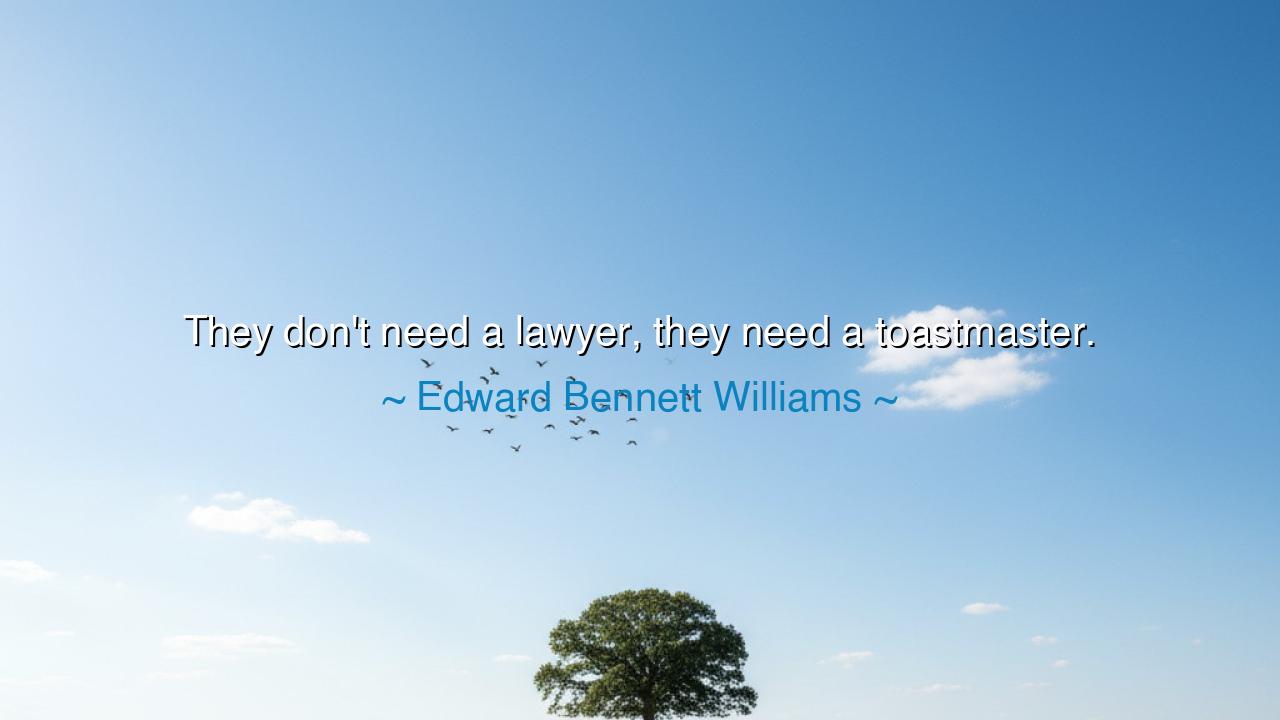
They don't need a lawyer, they need a toastmaster.






Hear, O listener, the keen and witty words of Edward Bennett Williams, a master of the courtroom and guardian of the spoken word: “They don’t need a lawyer, they need a toastmaster.” This phrase, sharp as a blade and yet filled with humor, is more than a jest. It reveals the hidden truth that not all conflicts, disputes, or failures of men require the intricate weapons of law. Oftentimes, what is lacking is not statutes or argument, but the art of clear speech—the ability to persuade, to calm, to inspire, to bind people together with words.
The meaning of this teaching lies in the distinction between law and communication. The lawyer is trained to battle with precedent, evidence, and technical skill. But there are times when the battlefield is not the courtroom, but the banquet hall, the council chamber, or the gathering of souls. In such moments, what is required is not the heavy machinery of legal defense, but the gentler art of the toastmaster—one who knows how to speak with grace, who can ease tensions, stir laughter, or awaken resolve. Williams, in his wisdom, reminds us that eloquence itself is a form of power, often greater than the force of law.
History offers abundant testimony to this truth. Consider the story of Pericles, the great Athenian statesman. In times of strife, when Athens teetered on the edge of conflict, he did not call for lawyers to interpret decrees, but stood before the people and spoke. His funeral oration, a speech both solemn and stirring, united the citizens, lifted their spirits, and reminded them of their shared purpose. Pericles was, in essence, a toastmaster of the highest order—his eloquence preserved harmony where legal arguments alone could never suffice.
So too, in the modern age, recall Winston Churchill in the darkest hours of the Second World War. Britain stood battered, her armies scattered, her people fearful of invasion. What she needed was not a lawyer to argue treaties or draft complaints, but a speaker whose words could kindle courage. Churchill’s speeches—“We shall fight on the beaches,” “This was their finest hour”—were toasts to the indomitable spirit of a people. His words rallied a nation and gave it strength to endure. Here again, we see Williams’s truth: sometimes what is required is not the defense of law, but the fire of speech.
Mark this well, O seeker: conflict among men does not always spring from broken laws, but from broken communication. Families quarrel, nations divide, friendships falter—not because statutes are unclear, but because hearts fail to understand one another. A carefully chosen word may heal where a thousand legal arguments would only wound. Thus, the toastmaster becomes as vital as the lawyer, for he wields the softer, subtler power: the power to move souls.
Let this be the lesson: cultivate the art of speech. Learn not only to argue, but to inspire; not only to defend, but to uplift. In your dealings, seek not always the weapons of law, but the balm of eloquence. Speak with clarity when others are confused, with humor when others are tense, with compassion when others are wounded. For words are bridges, and those who know how to build them can prevent conflicts before they need courts to resolve them.
Therefore, O child of tomorrow, honor the wisdom of Edward Bennett Williams. Do not rush always to lawyers when strife arises; ask first if what is needed is a toastmaster, a voice of reason, grace, and persuasion. For in many of life’s trials, it is not justice we lack, but understanding. And understanding, born of words well spoken, is the truest foundation of peace.






AAdministratorAdministrator
Welcome, honored guests. Please leave a comment, we will respond soon